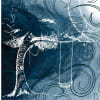Resurrection

Rahman emerged from his grave in the middle of the night. His return from the dead took place in no more than 10 days after his passing away. From what I knew of his wretched nature, he would not have lasted there any longer. He could not even complete a whole year in all the schools he attended, so he remained illiterate all his life. While all our friends were acquiring degrees from every corner of the world, Rahman was dishing out his good-for-nothing nature all over the place in the country. When Safdar of Pashchimpara and I had just retired from our jobs and came back home to our village, Rahman arrived out of the blue, after a month. It had been years since we last met. Deliberately, I did not ask him about his whereabouts because he never finished his stories. Unfortunately, the news of his death had reached us before we could meet him again for the second time.
Rahman came straight to me from the cemetery. He woke me at midnight and said, "How come you didn't even cry for me? I wonder if you're at all saddened by my passing away."
The day after the political party of the government had their meeting, some leaders of the opposition party came to the village too. However, the police and the student leaders of the political party in power did not allow them to enter. So, they went back to the city and said the government had arranged this whole drama of Rahman's resurrection to hide their failure from the public. By faking the story of Rahman, the government had once again proven that they were not the real patron of Islam. What they were doing is a big disgrace to Islam.
I rub my eyes and reply, "I knew you'd return, so I didn't waste my tears."
After having a cup of tea, Rahman leaves in the middle of the night. My wife is very displeased by having to brew his tea at this time of the night.
In the meantime, Rahman's brother's children have already divided his property amongst themselves since he did not have his own family. They were also aware of his character, hence were grabbing his fortune as promptly as they could. The people to whom he owed money had forgiven him disappointedly, but now they have started coming back and asking for their dues too. Rahman had borrowed five thousand taka from me so that he can now pay back some of those debts.
Meanwhile, the news of Rahman's revival has created much upheaval in town. Youngsters from the neighboring villages have thronged around him to take selfies and were uploading them on Facebook. Some were inquiring about his experience of faith interrogation in the grave: what are the angels Munkir and Nakir assigned to do after death. Rahman remains calm and smiles at their queries. Journalists are hustling in groups and interviewing them over again. However, they did not get the kind of information they were looking for, so they published news according to public demand. One headline in a newspaper appears–Mystery Remains Unresolved: Is this the Resurrection of a Holy Saint or Dajjal, the Deceitful Messiah? My wife dolls up for TV channel interviews to fabricate stories based on her meager experience of making a cup of tea for Rahman. In one interview, I overheard her saying that the night Rahman came to visit us, our whole house lit up like a tube light. His body even bore the silhouette of the Holy Kaaba; the very moment he finished sipping the tea, he vanished before our eyes.
The next day, I noticed many known and unknown people crowding outside our house to get a glimpse of the sofa where Rahman sat but she stopped people from entering our living room without performing their ablution.
Thousands of people from all parts of the country are running to him to request pani-pora, which they believe is a panacea for all diseases. But Rahman refuses to perform this ritual of making holy water by reciting verses and blowing in the water. So, the people rushed to the holy pond to collect the cure-all water in bottles. This was the pond where Rahman bathed the first time after his reappearance from the grave. Seeing the number of people gathering, the owner of the pond, Rahim Mollah started charging ten taka for each litre of water. Rahim Mollah's younger brother, Rob Mollah, also points at his pond saying, "Baba Hazrat Rahman took his bath here the following day in my pond. Subhan Allah! Glory to God! It's only five taka per litre." In the meantime, people from the tax department have also come to fix a vat for each bottle.
Simultaneously, a bus carrying people wanting pani-pora turned turtle in the ditch while coming through the narrow village road and killed 20 people. Most of the casualties were hale and hearty and only came to fetch pani-pora for their dying relatives.
On the other hand, a fair has been organised in the vacant space on the northern side of the village, sponsored by a large mobile company. They are selling jalebi, singara, peyaju, hand fans, and of course, Rahman's cure-all water. The first thing that people started buying was the hand fans. It had been scorching hot that day so their demand for the fans increased their price. It appeared some families could build their own brick houses just by selling just hand fans. Those who could not return home on the same day planned to spend the night on the verandas or terraces of the village school. The school has been temporarily shut down to serve this purpose. This sparsely populated village, situated on the periphery, appears to have conquered the upazila town with its newfound boisterousness.
The MP has been here with leaders and workers of his team and a group of journalists. Sitting next to Rahman, he gives an elaborate speech. The MP is an engineer by profession and had his higher education abroad. He says that in the history of mankind, this is an exemplary incident, and it amazingly took place only during his government's tenure. It is because their government was able to spread the logic of religion based on science education in the country, the Almighty has sent this message of satisfaction through the resurrection of Rahman. For this reason, he announces that the village will have massive road constructions and more infrastructural development within a month.
The day after the political party of the government had their meeting, some leaders of the opposition party came to the village too. However, the police and the student leaders of the political party in power did not allow them to enter. So, they went back to the city and said the government had arranged this whole drama of Rahman's resurrection to hide their failure from the public. By faking the story of Rahman, the government had once again proven that they were not the real patron of Islam. What they were doing is a big disgrace to Islam. Nevertheless, they would not be able to fool the God-fearing people of this country.
I have been at home listening to different maulanas on YouTube, the Muslim priests were stirring up diverse religious interpretations of Rahman's resurrection. One of them said the resurrection of Rahman was a warning to the Nasaras, the early Jewish-Christian sect, hailed as the non-believers or atheists that was recorded in Islamic history. Another one claimed Rahman had spoken to him in his dream before his resurrection. He told him that the women of Bangladesh were alluring the menfolk to walk away from Allah's path with their tight-fitting Western attires. "To guide people who have gone astray, we must stop our women from studying at the university. They should be sent to the madrasa, to Islamic religious institutions, and be draped in proper Islamic clothes." Another Islamic expert said in his preaching that Rahman had reappeared to warn us about God's impending wrath. "There is still time, and we must cut ties with the non-Muslim world to stop this from happening. We must go for jihad, wage an Islamic crusade against the atheists of the world. Hazrat Rahman will be leading that war supported by Allah and Rasul, the messenger of God."
On Facebook, I read a post that a few Bauls, the mystic minstrels of Lalon Shah's shrine, from Kushtia have claimed that it was Shaiji himself who had reappeared as the reincarnation of Rahman. They say that Shaiji from his shrine informed them that he would return one day to remind the people of this world about standing in unity against all kinds of discrimination among humankind. They claim that Shaiji told them about this on the same night Rahman came alive. And they began singing and calling him,
"Joy guru":
"Shai, the leader of three lives–the before, now, and afterlife.
Who is neither born nor dies.
Shiraj Shai thus calls on Lalon Shai–
Know the truth at all times."
Surprisingly the one, who is the centre of all this attention, celebration, and discussion–Rahman–is suddenly nowhere in sight. Everyone searches for him desperately in his locality, but cannot be found. Every day, people talk about where they had last seen him. Some say they saw him at the mosque when they went for the fajr. Others declare they saw him in the blazing heat of noon, bathing in the cool water of the shallow machine. Some proclaim they spotted him at midnight flying away with his elongated body in the air.
Numerous stories are heard from different parts of the country. One pickpocket from the city reports that while he was mugging, Rahman suddenly appeared from nowhere and broke his leg. The police rescued the thief in that state with his right leg broken. After this incident, the level of crime also seems to have dropped in the country.
While Rahman is nowhere to be seen, his omnipresence is heard of again from different sources, he suddenly reappears at my house at midnight one day. This time, my wife goes to make tea for him enthusiastically. She leaves a jug of water on the table and whispers in my ears to tell him to recite verses and blow in it. Rahman leaves before the tea arrives. He says he was very exhausted and needed to rest. I walk him to the grave.
The next day, when this event again comes to light, a group of people gets busy cementing Rahman's grave. This arrangement is done so that Rahman cannot get away as easily this time. While another group prepares themselves with sticks and surrounds the grave for protection.
By this time my wife's upset stomach is fully cured. And oh, I have completely forgotten to tell her that it was not Rahman, but I who had recited the holy verses and blew on the jug of water that night!
Masrufa Ayesha Nusrat is an Assistant Professor of English at East West University. She occasionally wears the cap of a literary translator. Celebration and Other Stories (2015) is a collection of her solo contribution of short stories in translation by contemporary women writers from Bangladesh.

 For all latest news, follow The Daily Star's Google News channel.
For all latest news, follow The Daily Star's Google News channel. 








Comments